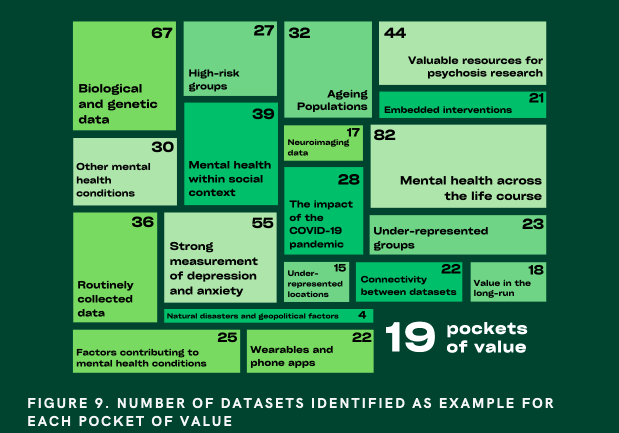
It’s long been recognised that mental health problems and mental illness can be a barrier to people playing an active role in society. But how can we better understand the complex interplay of biological, psychological and social mechanisms in the development and resolution of mental health problems? Reliable, longitudinal data sets are a vital tool for researchers in trying to resolve this complexity.
Funded by Wellcome, a team from King's College London, Institute of Psychiatry, Psychology and Neuroscience, the ODI and MQ Mental Health Research worked together to identify and gather information about promising open, longitudinal data sets from around the world. Looking at data from academia, from business, from the public sector and published through open data portals.
King's College London, Institute of Psychiatry, Psychology and Neuroscience (KCL) have published the full report for the project, Landscaping International Longitudinal Datasets.

By scanning and characterising more than 3,000 data sets the team was able to: identify ‘pockets of value’, additional insight that is useful for focusing research and additional data gathering, and the most promising data sets for possible ‘enrichment’.
Here at the ODI we focused on working with business and public sector health institutions and scanned open portals to identify suitable data sets. We were able to build on our previous work with the WHO (Data landscaping and health data governance) examining the availability of data through the lens of our mission to make more data open and make shared data more useful.
We found that data sharing is limited amongst the non-academic organisations we researched. We found that data sharing is held back by concerns such as: commerciality and perception of value, data sensitivity and liabilities, data quality and poor meta-data. These concerns impact opportunities for data sharing and re-use to the detriment of the data landscape within the sector.
If the bigger players in the health sector were able to exert their influence, the amount and quality of data available to support research into mental health could be increased substantially by doing the following:
- Convening stakeholders to highlight the challenges of finding and sharing data and exploring and co-creating solutions
- Establishing or adopting existing standards and FAIR principles to make data findable and reusable.
- Advocating for open science and open research outside of academia in order to encourage a culture of sharing, collaboration and reuse to limit the number of datasets kept closed.
- Explore options for motivating organisations to share data through incentives (financial, social), requirements (policies, regulations) and novel data sharing approaches such as data portals and the establishment of data institutions.